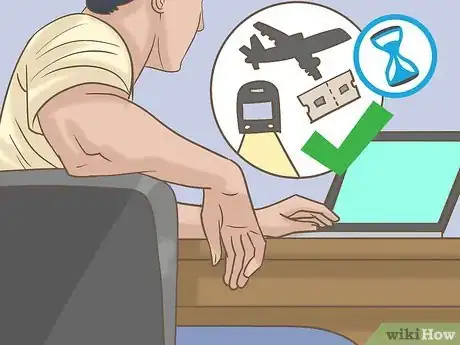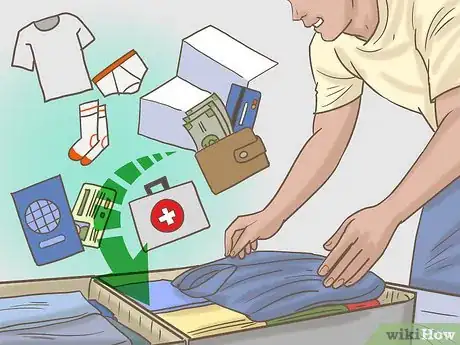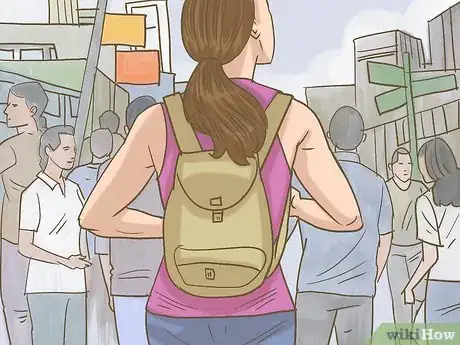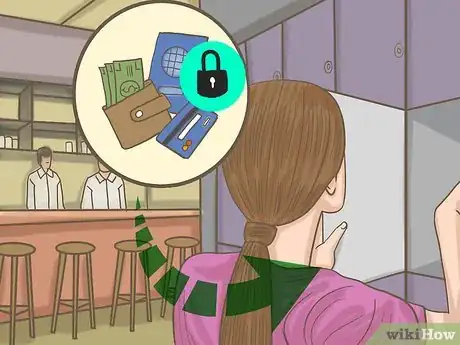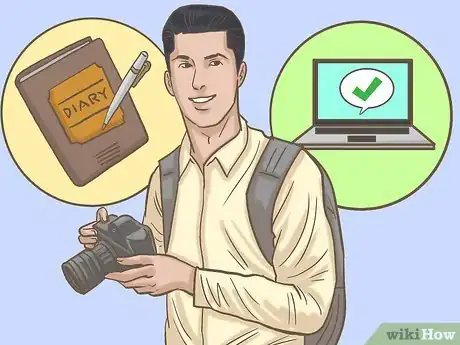This article was co-authored by Archana Ramamoorthy, MS. Archana Ramamoorthy is the Chief Technology Officer, North America at Workday. In 2019, she went on a three-month sabbatical from her work and solo traveled throughout Southeast Asia. She is a product ninja, security advocate, and on a quest to enable more inclusion in the tech industry. Archana received her BS from SRM University and MS from Duke University and has been working in product management for over 8 years.
There are 10 references cited in this article, which can be found at the bottom of the page.
This article has been viewed 41,209 times.
Traveling alone can be an incredibly rewarding and fun experience. It can also be dangerous without the proper preparation. With the right planning, you can make the best of your solo trip, be prepared for anything and make memories you'll carry with you forever.[1]
Steps
Preparing for the Trip
-
1Outline an itinerary and budget for your perfect trip. Think of all the places you want to see, food you want to eat and activities you'd like to do. You don't want to miss out on anything or run out of funds on your trip. Figure out what's possible for your budget and start crafting an agenda.[2]
- If you're going on a multi-destination trip, create an itinerary for each destination.
- Read travel guides and reviews to figure out what's really worth your time.
- Check local event guides for any seasonal activities that might align with your trip.
-
2Plan your flights and ground transportation in advance. Getting around by yourself in a new place can be challenging. Take the time to research the best airport to fly into at your destination. Research competitive ticket prices between different airlines by setting up flight alerts with a travel search engine. Once you land, make sure you know how to navigate from the airport to your accommodations.
- Make sure you can pay for a taxi, train ticket or whatever else may be necessary as soon as you get off the plane.[3]
- See how the locals get around. If your destination has strong public transportation, a bus pass can be a great way to see the city. Maybe you're headed somewhere bike-friendly, there may be rental options.
Advertisement -
3Book your accommodations ahead of time. Before you get there, make sure you know where you'll be sleeping every night. Booking accommodations in advance will help you avoid high costs and “No Vacancy” signs. As a solo traveler, you have a lot of options when it comes to lodgings. Apartment rentals and hostels can be affordable options if you're traveling on a budget.
- Location is incredibly important. Decide if you want to be near tourist attractions and events or something with a more local vibe. You'll want a neighborhood where you feel comfortable and can easily get around.
-
4Educate yourself on your destination and its customs. As a solo traveler, it's important that you're aware of everything going on around you. Research cultural norms to avoid any embarrassing situations. If you're visiting a foreign language-speaking country, study key phrases and the correct pronunciations. Make sure you know how much items like food and toiletries cost so you can budget properly. Understand what the weather is usually like during the time of your visit so you can pack appropriate clothing.[4]
- There are a few phrases that are universal. A few common phrases are:[5] "Where is the bathroom?," "I need help," "My name is...," "Hello," "Goodbye," and "Thank you."
-
5Pack the things you need and nothing you don't. Pack light! Traveling alone is hard enough, you don't want to be slowed down by multiple pieces of luggage. Try to contain your items to one bag that you can easily carry. Traveling light will give you greater mobility and make flights and transportation less of a hassle. If some items you need are difficult to travel with, it may be cheaper and easier to buy them when you land. Don't bring any expensive items that could risk being stolen.[6]
- Pack for the appropriate weather conditions. Common items are: a jacket, socks, underwear, 2 pairs of shoes, 3 pairs of jeans, two light tops and two warmer tops. You may consider special weather items like a bathing suit or rain jacket.
- Pack for emergencies. Common items are: copies of all your important documents, a travel first aid kit, cash, and a map.
- Pack for passing the time. Traveling alone can be boring. Make long bus rides more interesting by packing a book, playing cards or games. This can also be a great way to meet other travelers.
- When you're packing clothes, stick with neutral colors like black, white, and beige since they'll work for a variety of occasions.[7]
Staying Safe During Your Trip
-
1Share your itinerary with someone you trust and check in often. It's always best to make sure someone knows where you are when you're traveling alone. Choose a friend or family member to give a copy of your agenda, passport, identification, insurance card, emergency contact information and anything else important. Schedule regular calls or email check-ins with them during your trip so they know you're okay.[8]
- Turn on location services on your phone and share your location with someone you trust so they can easily find out where you are if something goes wrong.[9]
- Keep this person updated about any major changes to your trip.
-
2Notify any necessary contacts that you won't be home. If you're traveling out of the country, contact your bank and the State Department to register your trip. This will help you avoid any issues with your bank account while overseas. If you have a trusted neighbor or friend, be sure to let them know how long you'll be gone so they can keep an eye on your home. Let them know if they should bring in your mail or water any plants.[10]
-
3Take your time and pay attention to your surroundings. Being in a new place can be exciting, but rushing can lead to mistakes. Take your time to make sure you have all your belongings with you and you know where you're headed next before leaving a location.[11]
-
4Backup all your important documents and files. Make sure you have copies of your passport, tickets, identification and emergency contacts with you. Your phone may not work in another country, so make sure you back it up prior to leaving and save any important messages to the device in the event that you can't find an internet connection.[12]
- Look into international phones. If your current phone plan won't work where you're traveling, it might be beneficial to get a burner (or temporary) phone with international minutes. Make sure you know the country code for calls and how to contact the authorities by phone.
-
5Act like a local and don't draw attention to yourself. Traveling alone can make you a target for scammers who keep their eyes out for tourists. Be aware of your surroundings, walk with confidence and know where you're headed before going out. Looking lost or staring at a map can be a dead giveaway to potential thieves.[13]
-
6Protect your possessions by locking them up. If you have any valuable electronics or pieces of jewelry, don't travel with them; keep them locked in a safe. If your hostel provides lockers, be sure to buy a personal lock for it and store any cash, credit cards and important documents in it at night.[14]
Enjoying Your Trip
-
1Sign up for a local tour to acquaint yourself with the city. Tours can be a great way to meet fellow travelers who might also be looking for company. Whether you're interested in art, history, architecture or music, there are tours that align with nearly every interest.
- If you're staying at a hotel or hostel, ask the staff or other guests if they recommend any bars, pharmacies, restaurants or locations nearby.
- Walk around and see how close you are to the nearest bus and train stops.
- Memorize the address of where you're staying or keep it saved on your phone.[15]
-
2Document your journey. Keep a diary or photo journal to remember every moment of your trip. Consider keeping a blog so your friends and family back home can follow along with your travels.[16]
-
3Go to events, coffee shops and restaurants with communal tables to meet people. Don't be afraid to introduce yourself to people. Traveling alone is a great chance to make new friends. Hostels with group activities or a bar can spark great conversations.[17]
- Make sure you're not spending too much time by yourself and try to limit your time on your smartphone or social media.[18]
-
4Be flexible. Even the best laid plans can fail, so be sure to have a backup plan in case anything goes awry. To make the most of your trip, it's best to go with the flow and accommodate fun itinerary changes or rest, if you need it. Don't be too impulsive, but be on the lookout for exciting opportunities you might not have known about.[19]
Warnings
- While traveling alone, be careful with any alcohol consumption. Be sure not to drink too much.⧼thumbs_response⧽
- In the event of any medical emergencies, make sure you know where the nearest hospital is located.⧼thumbs_response⧽
References
- ↑ https://www.smartertravel.com/15-mistakes-avoid-traveling-solo/
- ↑ https://solotravelerworld.com/travel-alone-tips/
- ↑ https://www.tripsavvy.com/find-cheap-flights-for-a-solo-traveler-3026961
- ↑ https://solotravelerworld.com/travel-alone-tips/
- ↑ https://www.gooverseas.com/blog/language-phrases-before-travel
- ↑ https://solotravelerworld.com/packing-list/
- ↑ Archana Ramamoorthy, MS. Experienced Solo Traveler. Expert Interview. 24 January 2020.
- ↑ https://www.forbes.com/sites/johnnyjet/2017/10/23/ten-tips-for-traveling-alone/#2e5af3ab7c49
- ↑ Archana Ramamoorthy, MS. Experienced Solo Traveler. Expert Interview. 24 January 2020.
- ↑ https://solotravelerworld.com/travel-alone-tips/
- ↑ https://www.gapyear.com/articles/travel-tips/27-tips-for-travelling-solo-from-a-die-hard-lone-traveller
- ↑ https://solotravelerworld.com/travel-alone-tips/
- ↑ https://www.gapyear.com/articles/travel-tips/27-tips-for-travelling-solo-from-a-die-hard-lone-traveller
- ↑ https://www.smartertravel.com/single-travel-tips-going-solo/
- ↑ https://www.gapyear.com/articles/travel-tips/27-tips-for-travelling-solo-from-a-die-hard-lone-traveller
- ↑ https://www.forbes.com/sites/johnnyjet/2017/10/23/ten-tips-for-traveling-alone/#2e5af3ab7c49
- ↑ https://solotravelerworld.com/travel-alone-tips/
- ↑ https://www.penguin.co.uk/articles/2018/07/five-top-tips-for-travelling-solo
- ↑ https://www.gapyear.com/articles/travel-tips/27-tips-for-travelling-solo-from-a-die-hard-lone-traveller

